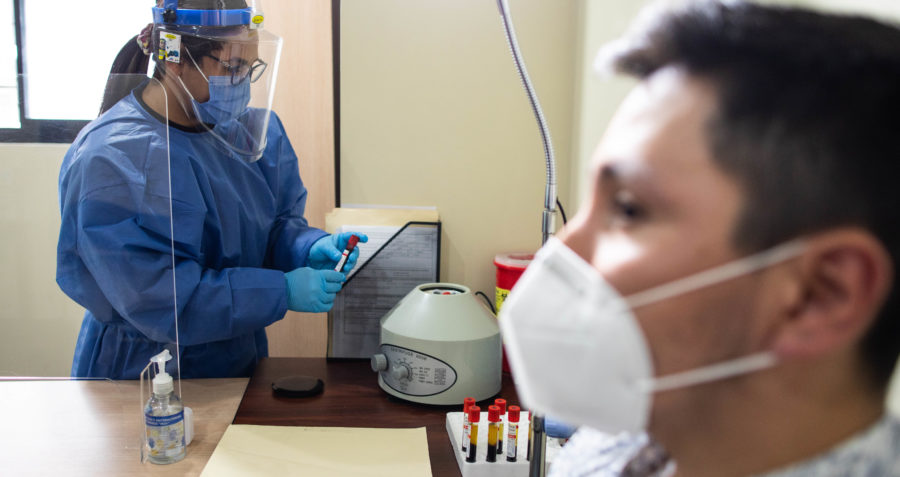Civil Society & Community Engagement in the UN High-Level Meeting on PPPR

An open letter on the engagement of civil society & communities at the High-Level UN General Assembly Meeting on Pandemic Prevention, Preparedness and Response
You can download this letter here
His Excellency Csaba Kőrösi, President of the General Assembly, and Mr. Stewart Simonson, Assistant Director-General, The WHO Office at the United Nations,
We the undersigned organisations [working in the area of global health, One Health, HIV/AIDS, Tuberculosis, pandemic threats, and other diseases] are writing to you in advance of the United Nations High-Level Meeting (HLM) on Pandemic Prevention, Preparedness, and Response (PPPR) which is tentatively being considered to take place during the UN General Assembly in September 2023.
Community and civil society leadership has been a pivotal component of the effective response to COVID-19, particularly in sustaining health services during lockdowns and other restrictions. In addition, one of the key learnings from the response to the HIV/AIDS pandemic over the last four decades has been that the vital leadership brought by communities is critical for addressing pandemics effectively. This includes reaching people who would otherwise be left behind, developing truly person-centred care models, and prioritising innovations of greatest need to those most affected.
For future pandemic prevention, preparedness and response to be effective, similar civil society and community engagement principles must be adopted and further supported. It is crucial to include community and civil society representatives as an advisory body in discussions and decision-making pertaining to the HLM. In December 2022 over 50 organisations called for civil society to be engaged as partners at the earliest stages of HLM planning and priority setting, starting with the development of a modalities resolution. While negotiations on the HLM modalities resolution are ongoing, we would urge WHO as the lead UN agency responsible for the organisation of the High-Level Meeting to build on the success of other HLMs which have been held at the UN General Assembly, and which demonstrated strong models of civil society and community engagement in their planning and implementation.
Strong civil society and community participation has been a hallmark of all of the HLMs on HIV/AIDS which have been held, and in the most recent meeting in 2021, a Multi-stakeholder Task Force was formed to enable civil society views to be reflected in the negotiations on the UN Political Declaration on HIV/AIDS. The Task Force was formally authorised to advise on the format, theme, and programme for multi-stakeholder consultations in the lead up to the HLM, help identify speakers for the HLM plenary and panel discussions as well as input in the HLM outcome document.
A similar model of civil society and community coordination through a designated Task Force has also been deployed for the United Nations General Assembly Special Sessions on the world drug problem in 2016, and in the HLMs on Tuberculosis and Universal Health Coverage (via the UHC2030 Civil Society Engagement Mechanism or CSEM), which are also being planned for the General Assembly this September. We would urge you to establish a similar multi-stakeholder advisory mechanism to enable civil society and communities engagement in the preparations of the interactive multi-stakeholder hearing as well as the organisation of the programme and the outcome document for the HLM on PPPR.
Specifically, we call for the following:
- In preparations for the PPPR HLM, and before the multi-stakeholders hearing in April 2023, an inclusive Multi-stakeholder Task Force with the participation of civil society and communities is established.
- The Multi-Stakeholder Task Force is mandated to share advisory expertise and perspectives of civil society, communities as well as other stakeholders such as pandemic survivors and community-based first responders within the HLM processes. These processes include: developing the key working groups, outcome document drafting process, and organisation and participation in the multistakeholder hearing and the HLM itself.
- The Task Force is mandated to advise WHO (as lead agency), the Office of the President of the General Assembly and co-convenors on the format, themes, and programme of the multi-stakeholder hearing and to help identify speakers for the hearing, as well as the HLM plenary and panel discussions.
We would appreciate the opportunity to discuss these priorities with you and share our experiences from engaging in previous successful and inclusive HLMs, and request a meeting at your earliest convenience to discuss these proposals. For reference the call for nominations for the Multi-stakeholder Task Force at the 2021 HLM on HIV/AIDS is available here.
Yours sincerely,
- Frontline AIDS
- AVAC
- Save the Children
- Harm Reduction International
- Christian Aid
- RESULTS UK
- Results Canada
- Platform for ACT-A Civil Society & Community Representatives
- STOPAIDS
- GFAN (Global Fund Advocates Network)
- INPUD (International Network of People Who use Drugs)
- West Africa Drug Policy Network
- HIV Legal Network
- Action for Animal Health coalition
- CSEM
- International Commission of Jurists
- Kimirina
- African Sex Workers Alliance
- Alliance for Public Health Ukraine
- Action for Global Health
- The Leprosy Mission England and Wales
- Health Action International
- Good Health Community Programmes
- TB Europe Coalition
- Physicians For Human Rights
- IFMSA (International Federation of Medical Students’ Associations)

